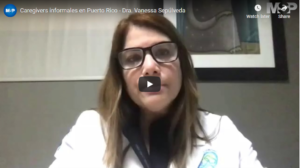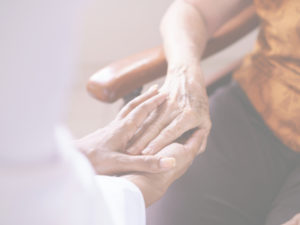By Mayra Acevedo. This article originally appeared in Spanish on Medicina Salud Publica.
SAN JUAN, Puerto Rico — While many co-workers in the media have been laid off because of the economic crisis the Puerto Rico was already facing before the Covid-19 pandemic, Carla, 35, and one of our best video editors at WIPR, arranged to work part time. One thing she cannot afford is getting sick with the coronavirus.
“Since the pandemic I only go to work and resolve moms’ basic needs. Because I’m worried mom might get sick I don’t do a lot of things I used to. I’d feel really guilty if she got sick,” Carla said.
Carla lives with her 73-year-old mother, who was recently widowed. She’s an informal caregiver like many other “Boricua” women on the island, who care for family members, mainly parents or grandparents.
There are no local statistics showing how many like Carla are caring for older adults without pay. The closest estimate was in a national survey published in November last year by the AARP Public Policy Institute, titled “Valuing the Invaluable: 2019 Update.” This family caregiving report quantified the non-paid services caregivers provide in 50 states, including Puerto Rico.
Stateside the hourly cost of those services was $13.81 per hour and $8.26 per hour in Puerto Rico. It shows there are 460,000 caregivers in Puerto Rico. They gave 380 million hours of care time for an estimated value of $3.2 billion dollars. It’s a huge amount of money taxpayers and local government have saved. Susan Reinhard, a lead author of the report and vice-president of AARP’s Public Policy Institute, explained that it is a first look at this population and the economic value of their services.
Another recent study conducted by the School for Caregivers of the Elderly at the Pontifical Catholic University of Puerto Rico (PCUPR) revealed that this group already faced enormous challenges when the pandemic broke out.
Nearly half of them (44.7%) earn less than $10,000 a year, which is below the U.S. poverty level. The majority of local informal caregivers are females (77.3%), a nearly half (48%) live on a state or federal pension, while 56% have no employment income. The study produced the “Profile of the Informal Caregiver of the Elderly in Puerto Rico” the first to collect social and demographic data on caregivers on the island.
The study also revealed the emotional toll for this unpaid labor: 9 out of 10 caregivers the researchers interviewed said their emotional health was being affected because of long-term caregiving for their loved one.
“During the pandemic these caregivers are extremely tired and feel very lonely. They already had a big burden, but now they are dealing with uncertainty and what we call the ‘psychological contagion.’” Dr. Angel Muñoz, the main investigator for the study and a clinical psychologist, describes this as the new-born fear of contracting Covid-19, such as after visits to the pharmacy or supermarket. Many of his patients expressed symptoms they attributed to the flu after a trip to a local shop.
The researchers conducted interviews with 300 caregivers in 45 different municipalities across the island.
The 2010 Census indicates there were 878,000 older adults (65+) in PR with 20% of them requiring some degree of care, according to the Pan-American Health Organization. This could mean that one out of five Puerto Ricans are already caregivers for an older adult.
Dr. Vanessa Sepulveda, professor of Geriatrics at the University of Puerto Rico School of Medicine, points out the need to provide them with support. “These caregivers need to develop what I call a ‘social bubble,’ a family network where the members commit to help out on a certain task.” She has also seen an increase in mental health problems among patients who are caregivers: “We will be seeing a spike in referrals to mental health clinics in the next two months.”

Dr. Vanessa Sepulveda, professor of Geriatrics at the University of Puerto Rico School of Medicine, shown in video interview accompanying online story in Spanish
Gerontologist also conducts workshops for caregivers every semester. The upcoming workshops will be remote ones.
Culturally, Puerto Ricans greatly value family. Puerto Rico’s Health Department surveyed patients in the government health program and found that 85% of the elderly want to receive services while they stay at home. The numbers should raise a flag for policy makers, according to Muńoz, who is already planning a second phase of the study. He aims to measure new and urgent needs of Puerto Rican caregivers who are facing extraordinary circumstance: a devastated local economy, recovery from major natural disasters, including recent earthquakes, and now a global enemy who’s threat has forced dramatic changes in everyday life. “ We need to provide training (capacitate them) and empower them and learn more about their needs,” adds Muñoz.
“Sounds nice ” says Carla after learning about the work at the School for Caregivers.
Mayra Acevedo wrote this article with the support of a journalism fellowship from The Gerontological Society of America, Journalism Network on Generations and the Commonwealth Fund. It will also to be published in Spanish in various digital platforms for Revista de Medicina y Salud Pública.
The opinions expressed in this article are those of the author and do not necessarily reflect those of the Diverse Elders Coalition.


